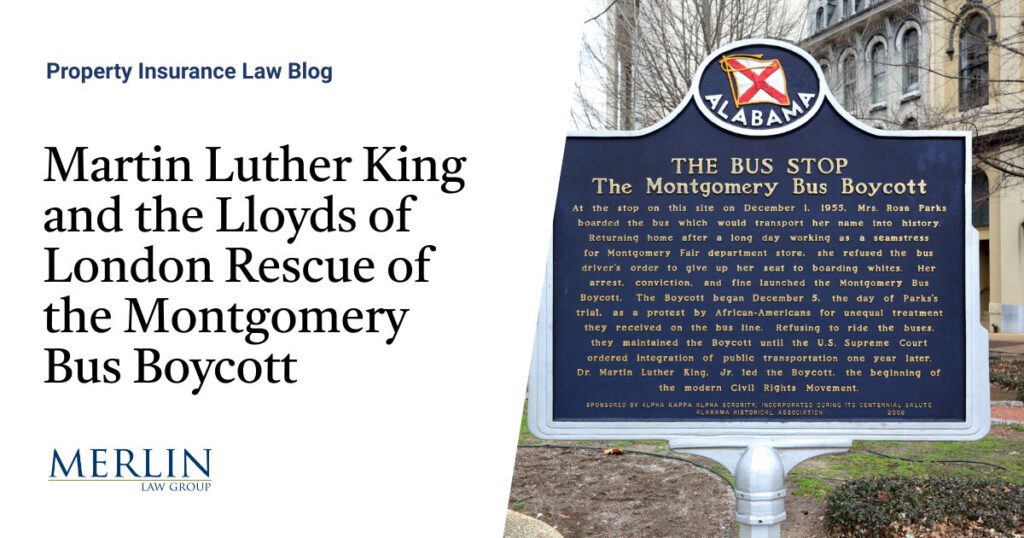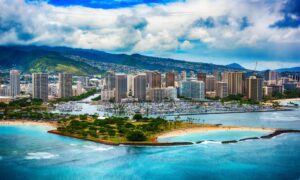Martin Luther King and the Lloyds of London Rescue of the Montgomery Bus Boycott

The Montgomery Bus Boycott was a pivotal event in the Civil Rights Movement. It was significantly bolstered using carpools. Initiated in 1955 after Rosa Parks’ arrest for refusing to give up her seat to a white passenger, the boycott aimed to desegregate public transportation in Montgomery, Alabama. African Americans, who were the primary bus users, needed an alternative transportation method to sustain the boycott. Community leaders, including Martin Luther King Jr., organized carpools to facilitate this. Volunteers used their vehicles to transport participants to work and other destinations. This ingenious strategy not only maintained the boycott’s momentum but also fostered a sense of unity and collective action among the African American community, ultimately leading to the desegregation of Montgomery’s buses.
Martin Luther King, Jr. Versus the Insurance Companies noted how insurance played a role in this controversy and that Lloyds of London came to the rescue:
In addition to private cars, local churches provided 22 station wagons for the carpool. Then as now, cars cannot be legally driven without insurance policies, and at one point the local insurance companies had cancelled the policies on 17 of the 22 station wagons. As King noted, the cancellations were done that the behest of the Montgomery White Citizens Council:
Formal objections to the car pool included the charges that the cars were improperly insured and the drivers were ‘morally unsuitable.’ It is true that for a time some cars were without insurance—since the White Citizens Council brought pressure on the insurance companies to cancel the policies on cars being used in the pool. But this was remedied long before the court case, when Lloyds of London insured each car to the amount of $11,000. As evidence of the moral unfitness of the drivers, the city listed the numerous traffic tickets with which it had harassed us from the beginning. Despite this strange justice, we decided to comply with the court order.
In How Automobiles Helped Power the Civil Rights Movement, The Smithsonian Magazine noted this insurance discrimination and that Lloyds of London played a crucial role in keeping the carpools rolling:
The elaborate carpool relied on a fleet of 15 ‘rolling churches’—station wagons donated to black churches by Northern supporters that were harder to seize than privately owned cars—to serve the 17,000 African American bus riders who took the buses twice every day. The service was like a carpool on steroids and relied on a combination of logistical smarts and improvisation. A black farmers’ association rented a safe parking lot to the fleet for cheap, and organizers arranged for a dispatch system. When white insurance companies refused to insure the cars, an African American insurance agent based in Montgomery finagled insurance through Lloyd’s of London instead. ‘It was no small effort to manage this fleet of vehicles,’ says Sorin. Private drivers participated, too, and those who didn’t help as part of the formal pool arranged rides for one another and picked up hitchhikers.
The Encyclopedia of African American History, 1896 to the Present, provided a footnote naming the insurance agent who obtained coverage from Lloyds:
[S]egregationist white Montgomerians placed more stumbling blocks in the boycotters’ path. White insurance companies refused to insure the carpool drivers’ vehicle, forcing King to consult a black Atlanta based insurer named T. M. Alexander who, because he was born in Montgomery, was keenly interested in the bus boycott. Alexander used his connections with Lloyd’s of London to obtain insurance coverage for the carpool drivers, and the boycott continued.1
As we reflect on Martin Luther King Jr.’s legacy on this day, let us remember the power of unity and perseverance in the face of adversity. The Montgomery Bus Boycott, bolstered by the ingenious carpool system and the crucial support from Lloyd’s of London, stands as a testament to collective resilience. It reminds us that when faced with injustice, innovative solutions and steadfast determination can triumph. In our ongoing pursuit of justice and equality, let us draw inspiration from this chapter of history. Let it fuel our commitment to advocate tirelessly for the rights and dignity of all, echoing the enduring spirit of Dr. King. Together, we can continue to make strides towards a more equitable and just society.
Thought For The Day
You must never be fearful about what you are doing when it is right.
—Rosa Parks
___________________________
1 Finkelman, Paul (Editor), The Encyclopedia of African American History, 1896 to the Present, Vol. 1, Oxford University Press, 2009. (Excerpts from Vol. 1 available online at https://books.google.com/books?id=6gbQHxb_P0QC&newbks=1&newbks_redir=0&lpg=RA2-PA360&dq=mia%20carpool%20birmingham%20lloyd%27s%20of%20london&pg=RA2-PA360#v=onepage&q=mia%20carpool%20birmingham%20lloyd’s%20of%20london&f=true)




